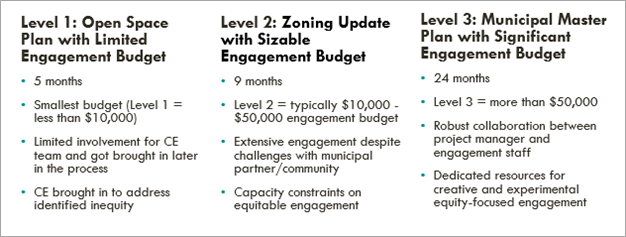How Do You Evaluate Equity in Community Engagement?
Piloting a qualitative evaluation of equitable community engagement processes
Written by Gloria Huangpu, Community Engagement Specialist
Raise your hand if the idea of measuring, assessing, and evaluating your work sounds like a drag. You’re in good company. However, you might also recognize that evaluation is really important—not only is it a way to demonstrate your impact, but taking the time to evaluate your work leads to learning, reflection, and improvement. The Metropolitan Area Planning Council’s (MAPC) Community Engagement Department has been developing an evaluation practice to do exactly that.
Nearly every project that MAPC takes on requires some degree of community engagement—reaching out to residents to involve them in the decision-making about policies and plans that affect their communities. Although the planning profession did not always value the general public’s experiences or knowledge, the MAPC Community Engagement Department seeks to change that by conducting community engagement in an equitable manner. This is a lofty goal, which makes it even more critical for the department to create a process to monitor, evaluate, and report how it is faring in this endeavor.
In 2022, the Community Engagement Department released its first Equitable Community Engagement Evaluation Report. This report examined the Community Engagement Department’s internal processes and piloted a qualitative research process to assess how closely the team’s work aligns with its stated approach to equitable community engagement. The report features three case studies of planning projects that Community Engagement staff worked on, at three different budget levels.
- Level 1 project (less than $10,000 engagement budget): An Open Space Plan with Limited Engagement Budget
- Level 2 Project (typically $10,000 - $50,000 engagement budget): Zoning Update with Sizable Engagement Budget
- Level 3 Project (more than $50,000 engagement budget): Municipal Master Plan with Significant Engagement Budget
Figure 1. Summary of the case studies:

Each of these case studies included a Community Engagement Department staff person, who led strategic planning and implementation of equitable outreach and engagement. It was clear that the projects where Community Engagement was brought in early and given sufficient resources were the most likely to meet the department’s standards for equitable community engagement. For example, the Community Engagement Specialist working on the Level 3 Municipal Master Plan project was able to conduct an entire anonymous focus group series for people of color in the town to share their priorities, ideas, and vision in a safe space. The master plan team was able to dedicate funding to translation and interpretation services, targeted outreach through community partners, and to gather input on how this key group of residents hoped their town would evolve into the future.
The Equitable Community Engagement Evaluation Report recommends that the department take further steps toward ensuring equitable community engagement practices are commonplace across all projects, not just the most well-funded. This begins with more explicitly acknowledging power disparities in participatory planning processes and the implications of such disparities on who has access to engagement opportunities. Taking an equitable community engagement approach means recognizing these disparate power levels and designing outreach and engagement to intentionally include those who are conventionally the most marginalized. Specific examples and initial drafts of tools are provided to help the department and municipalities make these strides.
As the Community Engagement Department continues to evolve to meet the needs and goals of MetroCommon 2050, Greater Boston’s regional land use and policy plan, the tools of evaluation will continue to prove useful in helping the department “walk the talk,” show its work, and advance toward a more equitable region. MAPC’s Community Engagement Department is at the start of an evaluation journey that will prove to be impactful on both its work processes and project outcomes across the region.
